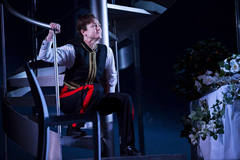| Opera Reviews | 27 April 2024 |
Scottish Opera's Ariodante offers musical richesby Catriona Graham |
|
| Handel: Ariodante Scottish Opera February 2016 |
|
|
Director Harry Fehr starts it, chillingly, with the curtain rising on the sound effect of a double hanging and TRUST IN THE LORD above the gallows. After the overture, there is snow falling outside the palace orangerie in which designer Yannis Thavoris places the action, a wintriness carried through in the ice-green and –blue of Ginevra’s frocks. This ‘Scotland’ punishes adultery with death; when Polinesso is rejected by Ginevra in favour of Ariodante, the harsh law gives him scope to take revenge. It’s a gem of a part for counter-tenor Xavier Sabata, so devious and duplicitous, were his moustache long enough, he’d twirl it. He persuades the maid Dalinda to wear Ginevra’s frock so Ariodante (and his brother Lurcanio) believe Polinesso’s claim to be sleeping with the Princess. Ariodante – a gamine Caitlin Hulcup – is distraught, his anguish vividly expressed in the gorgeous ‘Scherza infida’, with singer and orchestra working well together for conductor Nicholas Kraemer. When Ariodante rushes off into the night in despair, he leaves the orangerie door wide open. Unsurprisingly, next time the curtain rises, the orange trees are frosted to death. The isolation of Sarah Tynan’s Ginevra is enhanced by the purity of her voice. Even when expressing her love, she is contained until, condemned to death by her father, she loses her mind. While she sleeps, dancers Lucy Ireland and Vince Virr enact her nightmare in one of Handel’s ballet interludes. Some characters clearly undergo psychological development; Dalinda (Jennifer France) starts as a soubrette, but ends the opera wiser and married to Lurcanio (Ed Lyon), who has loved her all along. Lyon, initially a bit wet, matures as he defends his (now thought dead) brother’s honour and sings more robustly. There’s a fatal flaw in Polinesso’s offer – even his voice sounds smug - to defend Ginevra’s honour in a fight to the death with Lurcanio. So, by the time Dalinda returns with Ariodante, Ginevra is clad for hanging. Nonetheless, it’s a short step thereafter to the double wedding followed by a jolly chorus during which the principals plant replacement seedling orange trees in the tubs. The relief of the King is clear, Neal Davies having done a good job of balancing between a father’s love for his daughter and a king’s duty to uphold the law. While the purists may wish a more authentically baroque production, the riches in the singing alone makes this a production worth seeing and hearing.
|
|
| Text ©
Catriona Graham Photo © James Glossop |

 Handel’s opera Ariodante may be set in Scotland - but not as we know it. There is a King, and a Duke of Albany called, improbably, Polinesso, but who has ever heard of a Princess Ginevra, who married Ariodante, in turn made heir to the throne? Especially since Scottish Opera’s production takes place in the 1950s, to judge by the frocks, while the men’s uniforms and furry hats look a bit Russian.
Handel’s opera Ariodante may be set in Scotland - but not as we know it. There is a King, and a Duke of Albany called, improbably, Polinesso, but who has ever heard of a Princess Ginevra, who married Ariodante, in turn made heir to the throne? Especially since Scottish Opera’s production takes place in the 1950s, to judge by the frocks, while the men’s uniforms and furry hats look a bit Russian.






